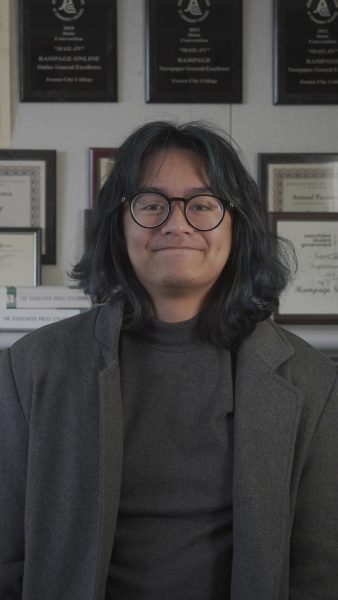The system of electoral politics in the United States is a liberal democracy, where we are meant to elect a representative for us. It is meant to be a disappointment.
One group tells us to vote for them to stop the worst evil from winning and vice versa. The deflection of the lesser evil is what gets us to where we are today.
The Democratic Party preaches social equity and reform of the system that only stops the political movement to the right. Once the Republican party replaces them, the cog turns to the right once more.
This is the ratchet effect, US politics continues to turn further right-wing as discourse grows increasingly unfiltered with hate and never sends the cog in the opposite direction of progress.
Joshua Shurley, a political science instructor at Fresno City College, described the U.S. as a one-party state with two factions, the Democrats and Republicans who serve the corporate class that funds them generously.
Shurley points to the control by corporations over the lives of people through pricing basic needs such as housing or food. Alongside the reputation of U.S. foreign policy in starting and enabling wars, Shurley stated that people do not have a say.
Local elections, where people have more say compared to statewide and national contests, still hold uphill battles between people and money players including land developers.
“We fetishize the idea of democracy [that people have the power], but we’ve never really been a society where people have power,” Shurley said.
Haneen, a Palestinian activist at Fresno State who asked to be identified by first name only, said it was important to engage in local politics because of its immediate impact on people around us. She also felt that voting is not the answer to our struggles.
A moral litmus test is a question posed to a politician that is answered by actions for voters to determine their electability. The litmus question of Palestine and US foreign policy exposes the faults of both parties.
Francesca Albanese, who is appointed by the United Nations as a special rapporteur that reports on the human rights situation in Palestine, said at a UN Human Rights Council meeting of the ongoing situation in Gaza, “the threshold indicating the commission of the crime of genocide has been met.”
According to a poll by the Institute for Social Policy and Understanding (ISPU), the majority of Americans supported a ceasefire in Gaza. For months the Biden administration thoroughly stood on the grounds of supporting Israel through weapons sales as reported by The Guardian while rejecting and now diluting calls for a ceasefire according to Al Jazeera.
It was only until March 25 that the US abstained from voting on a UN Security Council resolution which called for a temporary ceasefire, thus allowing the notion to pass 14-0.
More than 34,000 people in Gaza have died according to the Gaza Health Ministry.
“People are waking up and are realizing that our government is complicit in this,” Haneen, whose family is from Palestine, said.
She feels that American interests align with Israel and are controlled by lobby groups such as the American Israel Public Affairs Committee (AIPAC).
The notion of voting for the sake of “harm reduction” is also questionable. As the media activist group Indigenous Action said, “It’s never clear how less harm is actually calculated.”
There is no quantifiable measure to reduce the harm of US drone strikes in the Middle East under the Obama administration or the continual support by Trump for Saudi Arabia to kill people in Yemen.
But the answer is not to switch off politics. Beyond the charades of presidential debates and rhetoric, politics is a matter of life or death for the marginalized.
“Liberation is gonna come from within the people, what we do, and how we take action,” Haneen said.
Shurley recalls the white-majority apartheid regime of South Africa that was not taken down through voting but with pressure through mass organizations to abolish the system.
This goal can be likened to the Boycott, Divestment, and Sanctions (BDS) movement which seeks to pressure Israel through economic disruption and boycotting target companies.
Haneen started the Students for Palestinian Liberation group at Fresno State which organizes a community for awareness and representation, which has included hosting teach-ins and cultural events.
Mass organization and disruption are not the easiest methods to push forward. But, people cannot keep running on the hamster wheel as Shurley put it.
In the dilemma of the lesser of two evils and harm reduction, people face the trap of having to compromise. Chances slightly increase in protecting a group of people from further marginalization, but the oppression of another increases.
Haneen said that people could still use the election to vote uncommitted rather than pick between the two evils.
“I just don’t want to be complicit in a genocide that this country is taking against my own people,” Haneen said.
This also presents third-party alternatives to the capitalist status quo that upholds these injustices.
Spending some time voting for small and important impacts is useful, but the real work begins with community and directly alleviating the circumstances of people instead of expecting the benevolence of an elected “representative” that will disappoint us.
“Get out there and join social movements, be a part of things and stop bowling alone,” Shurley concluded.
Martin Luther King Jr. said in his Letter from Birmingham Jail that a certain group, the white moderate, tries to set a timetable for when the oppressed can start advocating for their freedom. The people who are oppressed are made to wait “until a more convenient season.”
With the continual turmoil of the world like in Gaza, the Democratic Republic of Congo and Haiti there is no time to wait. If not now, when?





